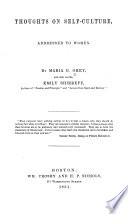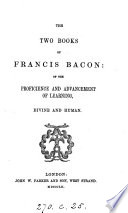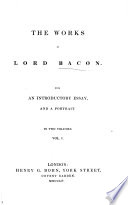 | Francis Bacon - 1850 - 892 pages
...erccl i mind, by submitting the shows of things to i desires of the mind ; whereas reason doth bud and bow the mind unto the nature of things. And we see, that by these insinuations and r> gruities with man's nature and pleasure, joincil ii with the agreement and consort it hath with... | |
 | Maria Georgina Shirreff Grey, Emily Anne Eliza Shirreff - 1851 - 496 pages
...serveth and conferreth to magnanimity, morality, and to delectation. And, therefore, it was even thought to have some participation of divineness, because...it doth raise and erect the mind, by submitting the show of things to the desires of the mind ; whereas reason doth buckle and bow the mind unto the nature... | |
 | Francis Bacon (visct. St. Albans.) - 1852 - 238 pages
...serveth and conferreth to magnanimity, morality, and to delectation. And therefore it was ever thought to have some participation of divineness, because...pleasure, joined also with the agreement and consort it hath with music, it hath had access and estimation in rude times and barbarous regions, where other... | |
 | Edward FitzGerald - 1852 - 172 pages
...does he prove ? " What, indeed, does Poetry prove ? " It doth raise and erect the mind," says Bacon, " by submitting the shows of things to the desires of...buckle and bow the mind unto the nature of things." But Sir Philip Sidney says, the poet shows the " nature of things" as much as the reasoner, though... | |
 | Francis Bacon - 1852 - 580 pages
...Its use is to satisfy the mind in these points where nature does not satisfy it. It was ever thought to have some participation of divineness, because...submitting the shows of things to the desires of the rnind^- whereas reason doth buckle and bow the mind into the nature of things. \ Poesy joined with... | |
 | 1853 - 604 pages
...morality, and delectation. And, therefore, it was ever thought to have some participation of divinenes?, because it doth raise and erect the mind, by submitting...buckle and bow the mind unto the nature of things. . . . In this third part of learning, which is Poesy, I can report no deficience. For, being as a plant... | |
 | Edwin Percy Whipple - 1853 - 434 pages
...serveth and conferreth to magnanimity, morality, and to delectation. And, therefore, it was ever thought to have some participation of divineness, because...submitting the shows of things to the desires of the mind." Now, Wordsworth, whether he appears to sing of the past or the present, is, in reality, singing... | |
 | 1853 - 676 pages
[ Sorry, this page's content is restricted ] | |
 | Barry Cornwall - 1853 - 300 pages
...be so called, perhaps the best explanation is that given by Lord Bacon, where he says, that' Poetry doth raise and erect the mind, by submitting the shows of things to the desires of the mind ;' though here, as in all the rest of the discussion, we should ever bear in mind, that poetry,... | |
 | Francis Bacon - 1854 - 894 pages
...serveth and conferreth to magnanimity, morality, and to delectation. And therefore it was ever thought to have some participation of divineness, because...pleasure, joined also with the agreement and consort it hath with music, it hath hud access and estimation in rude times and barbarous regions, where other... | |
| |